Religion, Morals and the Intellect: Routledge Revivals
Autor F. E. Pollarden Limba Engleză Hardback – noi 2024
Din seria Routledge Revivals
- 9%
 Preț: 767.40 lei
Preț: 767.40 lei - 9%
 Preț: 1004.17 lei
Preț: 1004.17 lei - 9%
 Preț: 934.94 lei
Preț: 934.94 lei -
 Preț: 230.80 lei
Preț: 230.80 lei -
 Preț: 294.72 lei
Preț: 294.72 lei -
 Preț: 258.66 lei
Preț: 258.66 lei - 9%
 Preț: 903.41 lei
Preț: 903.41 lei - 18%
 Preț: 695.85 lei
Preț: 695.85 lei -
 Preț: 296.10 lei
Preț: 296.10 lei -
 Preț: 342.36 lei
Preț: 342.36 lei - 9%
 Preț: 606.35 lei
Preț: 606.35 lei -
 Preț: 309.94 lei
Preț: 309.94 lei - 9%
 Preț: 729.99 lei
Preț: 729.99 lei -
 Preț: 256.94 lei
Preț: 256.94 lei -
 Preț: 230.80 lei
Preț: 230.80 lei -
 Preț: 259.47 lei
Preț: 259.47 lei - 9%
 Preț: 903.80 lei
Preț: 903.80 lei -
 Preț: 153.81 lei
Preț: 153.81 lei -
 Preț: 258.66 lei
Preț: 258.66 lei -
 Preț: 294.91 lei
Preț: 294.91 lei -
 Preț: 200.66 lei
Preț: 200.66 lei -
 Preț: 199.85 lei
Preț: 199.85 lei -
 Preț: 308.89 lei
Preț: 308.89 lei -
 Preț: 295.04 lei
Preț: 295.04 lei -
 Preț: 382.23 lei
Preț: 382.23 lei -
 Preț: 258.66 lei
Preț: 258.66 lei -
 Preț: 343.21 lei
Preț: 343.21 lei - 9%
 Preț: 640.90 lei
Preț: 640.90 lei - 9%
 Preț: 605.71 lei
Preț: 605.71 lei -
 Preț: 228.88 lei
Preț: 228.88 lei -
 Preț: 257.67 lei
Preț: 257.67 lei -
 Preț: 245.10 lei
Preț: 245.10 lei -
 Preț: 258.52 lei
Preț: 258.52 lei -
 Preț: 258.66 lei
Preț: 258.66 lei -
 Preț: 368.93 lei
Preț: 368.93 lei -
 Preț: 246.37 lei
Preț: 246.37 lei - 9%
 Preț: 764.34 lei
Preț: 764.34 lei -
 Preț: 258.66 lei
Preț: 258.66 lei -
 Preț: 326.26 lei
Preț: 326.26 lei -
 Preț: 286.98 lei
Preț: 286.98 lei - 8%
 Preț: 418.23 lei
Preț: 418.23 lei - 5%
 Preț: 231.22 lei
Preț: 231.22 lei -
 Preț: 267.15 lei
Preț: 267.15 lei -
 Preț: 295.62 lei
Preț: 295.62 lei - 9%
 Preț: 638.61 lei
Preț: 638.61 lei -
 Preț: 260.85 lei
Preț: 260.85 lei -
 Preț: 339.90 lei
Preț: 339.90 lei -
 Preț: 381.17 lei
Preț: 381.17 lei -
 Preț: 294.53 lei
Preț: 294.53 lei -
 Preț: 294.72 lei
Preț: 294.72 lei
Preț: 425.69 lei
Preț vechi: 462.70 lei
-8% Nou
Puncte Express: 639
Preț estimativ în valută:
81.47€ • 84.41$ • 67.99£
81.47€ • 84.41$ • 67.99£
Carte tipărită la comandă
Livrare economică 21 martie-04 aprilie
Preluare comenzi: 021 569.72.76
Specificații
ISBN-13: 9781032903361
ISBN-10: 1032903368
Pagini: 184
Dimensiuni: 138 x 216 mm
Greutate: 0.5 kg
Ediția:1
Editura: Taylor & Francis
Colecția Routledge
Seria Routledge Revivals
Locul publicării:Oxford, United Kingdom
ISBN-10: 1032903368
Pagini: 184
Dimensiuni: 138 x 216 mm
Greutate: 0.5 kg
Ediția:1
Editura: Taylor & Francis
Colecția Routledge
Seria Routledge Revivals
Locul publicării:Oxford, United Kingdom
Public țintă
General, Postgraduate, Undergraduate Advanced, and Undergraduate CoreCuprins
1.The Points at Issue 2. Ideas or Men? 3. Reason and Progress 4. Explanation 5 Religion a Life 6. Faith 7. The Service of the Intellect 8. The Arbitrary and the Magical 9. The Unity of the Mind 10. The Unseen World 11. Rites and Symbols 12. A Rational Morality 13. Some Ethical Problems 14. What Then of Education? 15. A Reasonable Religion.
Recenzii
Original Review of Religion, Morals and the Intellect:
‘…there is a quiet competence in handling the issues involved which calls for respect and admiration.’ E.S. Waterhouse, Philosophy, Vol 7, No. 27 (1932).
‘…there is a quiet competence in handling the issues involved which calls for respect and admiration.’ E.S. Waterhouse, Philosophy, Vol 7, No. 27 (1932).
Notă biografică
Francis E. Pollard (1872-1951) one of the original members of the War and Social Order Committee, was a teacher at Bootham School, and later secretary of the National Peace Council.
Descriere
Originally published in 1932, and therefore inevitably of its time, this book discusses the place of the intellect as a guide to religious truth. The author's work brought principles from Quaker decision-making to bear on wider questions about democracy and religion.
